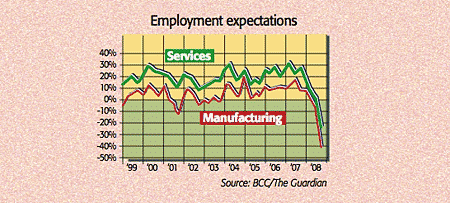
“Frightening.” That’s the British Chamber of Commerce’s assessment of the state of the economy, and no wonder. Its survey of the fourth quarter said that the deterioration was “unprecedented”, with a record slide in confidence in both the services and the manufacturing sector. Separate figures revealed a 7.4% annual drop in factory output in November, the worst fall since the early 1980s industrial meltdown.
Consumers are in full retrenchment mode, with the British Retail Consortium reporting the worst Christmas since its records began in 1994. Like-for-like sales fell 3.8% year-on-year in December. Average house sales per estate agent hit an all-time low last month, according to the Royal Institution of Chartered Surveyors (Rics). “Without mortgage finance, the housing market is at a standstill,” said the Rics’s Ian Perry. Unemployment looks on track to hit three million by the end of the year from just under two million now. On Monday alone, 4,000 jobs were lost or gravely threatened as sofa retailer Land of Leather collapsed and firms ranging from digger manufacturer JCB to tableware group Waterfood Wedgewood ditched workers. Meanwhile, we can’t count on exports to alleviate the recession as demand everywhere has fallen off a cliff (see World trade hit by collapsing demand). The value of British goods sold abroad plunged by almost 6% in November alone, pushing the trade deficit on goods up to a monthly record. The weak global environment has negated any boost from the slide in sterling.
Government to the rescue?
Having “contributed generously” to this “ugly mess”, the government has stepped up its efforts to “help generously”, said Ian Campbell on Breakingviews. However, its first effort this week, an attempt to prop up the job market by offering companies £2,500 to recruit and train those unemployed for over six months, is pretty feeble. Companies are looking to shed staff and the subsidy is too small to “change many minds”, said the FT.
What next?
Then the government turned to the dearth of credit that lies behind many of the job losses, pledging to stand behind up to £21bn of bank loans to small and medium-sized businesses. This may help a bit, but “it cannot be a substitute for additional measures” to help the banking sector “fix the problems” causing the “lending strike”, noted George Hay on Breakingviews, such as the frozen wholesale markets. The government needs to go further and guarantee mortgage-backed securities, or buy up banks’ toxic assets, thus allowing banks to clean up their balance sheets and lend more – although both of these options are fraught with difficulty. But until the financial crisis is resolved, said the FT, recovery will remain elusive.